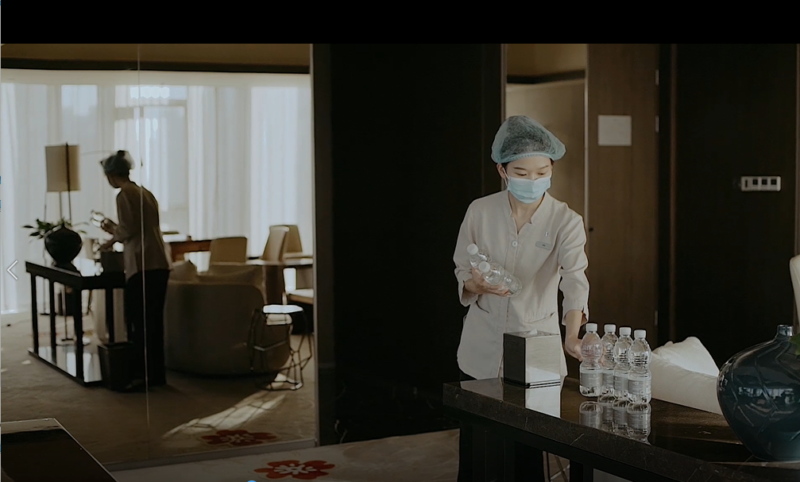Travel alert: Purdue hospitality experts dish on memorable hotel experiences
Written by: Tim Brouk, tbrouk@purdue.edu
Large cities far and wide have lodgings galore. So, which one to pick? Thankfully, faculty and alumni of the Purdue University White Lodging-J.W. Marriott, Jr. School of Hospitality and TourismManagement (HTM) are here to help.
Utilizing what they teach or what they learned at Purdue, these hospitality experts share what makes hotels stand out from the rest.
Conrad Maldives — Rangali Island, Maldives

Liz Hoover (BS, ’13) stands outside of her room at the Conrad Maldives hotel on Rangali Island.
Recommended by: Liz Hoover (BS, ’13), team leader and groups specialist, supplier relations management, Travelink, Nashville, Tennessee
Ask for Masyh: While the breathtaking views and luxuriousness were unforgettable, the impeccable service at the Conrad Maldives hotel was what impressed Hoover the most.
“Upon arrival, we were greeted with cold towels to wipe our hands and face, a welcome drink, and many staff members, including our private butler, all greeted us like old family and friends welcoming us to the island,” Hoover recalled. “During our stay, the butler named Masyh became our dear friend and took care of our every need, question, reservation and even transportation. We had direct contact with him through WhatsApp so we could communicate all our wants and wishes.
“The staff had an ever-watchful eye and could anticipate our needs before we even knew what we needed.”
Then there were the almost outrageous features within the hotel during her stay: The overwater villa had a glass floor to see directly into the water below to view the sea life, and the Undersea Restaurant was five meters underwater. Hoover said it was the world’s first submerged restaurant.
“In our opinion, the hotel did everything right from start to finish: a special welcome experience, a connection with staff, prioritizing communication and meeting wants and needs of the guest, clean and maintained property and accommodations, offering experiences on site that are iconic and reflective of the environment around us, and so much more,” she added.
Hotel Riu Tikida Garden — Marrakech, Morocco

HTM associate professor Susan Gordon’s recent stay in Morocco featured a patio entrance to her room right up to the swimming pool.Susan Gordon
Recommended by: Susan Gordon, associate professor
Super service: When met with a problem checking in, Gordon was told she would be transferred to a “sister” hotel at the same rate for one night due to overbooking. This is called “walking” a guest in the hospitality industry. However, a manager worked to alleviate the stressful situation by halving the cost at the sister hotel and upgrading her to a suite. The next day, Gordon was surprised to find her room back at Hotel Riu Tikida Garden was changed to “a swim-up room that had lounge chairs on our patio and the pool right at our patio.”
“He also sent champagne and pastries to the room more than once during the week,” Gordon said.
“This example is one that I would share with students to illustrate why it is important that employees must be properly trained to walk guests — or the manager should handle the walk situation — and also as one that shows the importance of service recovery when a guest experiences a service failure.”
Rosewood Hotel Georgia — Vancouver, Canada

The Rosewood Hotel Georgia at night.
Recommended by: Shawn Johnson (BS, ’91), senior vice president for international travel company Abercrombie & Kent, based in Chicago
Happy and hospitable birthday: International work travel is usually not the best way to celebrate a birthday, but the hospitable staff of Rosewood Hotel Georgia made Johnson feel at home. A colleague tipped the hotel management that it was his birthday, and they upgraded Johnson to a junior suite. But that wasn’t his only gift.
“I was blown away when I came home from dinner and my suite had been refreshed, bed turned down and a small cake and flowers were on the coffee table with a note from the front desk team wishing me the happiest of birthdays and thanking me for staying with them,” Johnson recalled fondly.
A 19-year employee at Abercrombie & Kent, Johnson said such “personalization” is key in hotel stays today.
“I’ve told dozens of people going to Vancouver they need to stay at the Georgia, and an upgrade to a junior suite is worth the splurge,” he added. “Their kind gesture, which cost them little, has generated at least 20 room nights in revenue from my personal referrals.”
Shangri-La and Renaissance hotels — China
Recommended by: Liping Cai, professor and director of the Purdue Tourism and Hospitality Research Center
Hospitable research: Cai is fresh from a research trip to China. As part of an ongoing project, he stayed at several multinational and regional hotels, many of which employed numerous Purdue HTM alumni. Over the weeks, he experienced exemplary hospitality. While his expectations were high, they were almost always exceeded on this visit overseas.
“These hotels take the host and guest relationship seriously,” Cai explained. “Walking into a place where you are treated like family is a truly unique experience. From the moment you step through the door, you are enveloped in a sense of warmth and belonging. The staff goes above and beyond to make sure you feel comfortable and cared for. It’s not just about the friendly greetings; it’s about the genuine interest they take in your well-being.”
Often, it’s the little moments or kindness that stand out the most.
“At Renaissance Nanjing Olympic Centre Hotel, the room maid turned on a no-disturb sign after making up my room and noticing that I was going to start an online meeting,” Cai recalled. “This level of care from a room-division employee transforms an ordinary visit into something truly special and grateful.”

A worker places water bottles on a desk in the Nanjing Renaissance hotel in China.Liping Cai
Discover more from News | College of Health and Human Sciences
Subscribe to get the latest posts sent to your email.